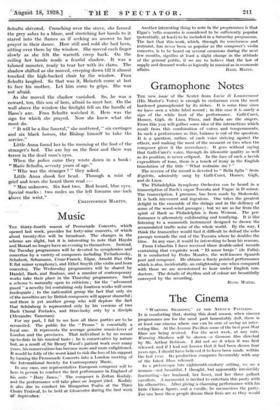Music
THE thirty-fourth season of Promenade Concerts, which opened last week, provides for forty-nine concerts, of which about twenty-five will be broadcast. The changes in the scheme are slight, but it is interesting to note that Haydn and Mozart no longer have an evening to themselves. Instead, the Tuesday programmes will be devoted to symphonies and concertos by a variety of composers including Tschaikowsky, Schubert, Schumann, Cesar-Franck, Elgar, Arnold Bax (the E flat minor symphony), and Ethel Smyth (the violin and horn concerto). The Wednesday programmes will be shared by Handel, Bach, and Brahtns, and a number of contemporary works take their place in the Thursday programmes. Such a scheme is naturally open to criticism ; for the "advanced guard" a novelty list containing only fourteen works will seem inadequate ; to the nationalist group the fact that only six of the novelties are by British composers will appear shameful ; and there is yet another group who will deplore the fact that Schonberg is represented only by his versions of two Each Choral Preludes, and Stravinsky only by a disciple (Alexandre Tansman):
For my part, I fail to see how all these parties are to be . reconciled. The public for the " Proms " is essentially a loyal one. . It represents the average genuine music-lover of London and the provinces. That individual is by no means up-to-date in his musical taste ; he is conservative by nature but, as a result of„Sir Henry Wood's patient work over many years, his conservatism has become more and more enlightened. It would be folly of the worst kind to risk the loss of his support by turning the Promenade Concerts into a London meeting of the International Society for Contemporary Music.
In any case, one representative European composer will be here in person to conduct the first performance in England of
• his suite " hary Janos.- _ The composer is Zoltan Kodaly, and the performance will take place on August 23rd. Kodaly is atso due to conduct his Hungarian Psalm at the Three Choirs Festival, to be held at Gloucester during the first week tif' September. • ' Another interesting thing to note in the programmes is that Elgar's 'cello concerto is considered to be sufficiently popular (potentially, at least)to be included in a Saturday programme. The fact that this work, which, through its conciseness and
• restraint, has never been so popular as the composer's violin concerto, is to be heard on several occasions during the next few months, signifies at least a slight change in the attitude of the general public, if we are to believe that the law of supply and demand works as logically in musical as in economic
































 Previous page
Previous page